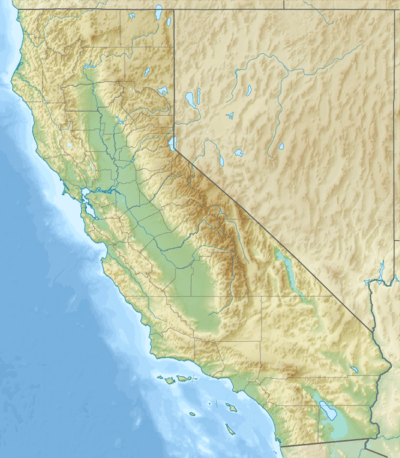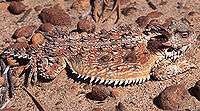Otay Mountain Wilderness
| Otay Mountain Wilderness | |
|---|---|
|
IUCN category V (protected landscape/seascape) | |
|
Signpost of Otay Mountain Ecological Reserve with Otay Mountain in the background | |
 Location in California | |
| Location | San Diego County, USA |
| Nearest city | Otay Mesa |
| Coordinates | 32°35′40″N 116°50′40″W / 32.59444°N 116.84444°WCoordinates: 32°35′40″N 116°50′40″W / 32.59444°N 116.84444°W |
| Area | 16,885 acres (6,833 ha)[1] |
| Established | 1999 |
| Governing body | Bureau of Land Management[1][2] |
The Otay Mountain Wilderness is a U.S. Wilderness Area located in San Diego County, California, 12 miles east of the city of Otay Mesa and just north of the Mexican border. Some parts of the wilderness area rise quickly from sea level, reaching a peak of just over 3,500 feet (1,100 m) at the summit of Otay Mountain.[3]
Wilderness status was conferred on October 7, 1998, effectively preserving 18,500 acres under protection of the Wilderness Act, a component of the National Wilderness Preservation System.[4] The legislation was signed by President Bill Clinton[5]:306 on December 11, 1999.[6]
Geography
The Wilderness lies in the San Ysidro Mountains,[3] of which Otay Mountain is the highest summit at 3,566 feet (1,087 m).[7] The mountain, and its immediate surroundings, are extremely rugged and include steep, often precipitous, canyon walls and hills.[8]
The public lands within the Otay Mountain Wilderness are one of the last remaining pristine locations in western San Diego County. Adjacent to the Mexican border, it is internationally known for its diversity of unique and sensitive plants. The area plays a critical role in San Diego's multi-species conservation plan.[4]:306
Natural history
The San Ysidro Mountains are remnants of a chain of ancient volcanoes from which meta-volcanic soils form, sustaining a diverse chaparral community dominated by chamise (Adenostoma fasciculatum),[9] mixed chaparral and coastal sagebrush habitats.[10]
Flora
The world's largest stand of Tecate cypress (Cupressus forbesii) are found at Otay Mountain Wilderness, as are at least 15 plant species that are candidates for Federal listing as threatened or endangered species. In all 37 plant species found on Otay Mountain are listed as sensitive by the California Native Plant Society, at least five, including the Tecate cypress, occur only on Otay Mountain or in the immediate are.[10]
Particularly important species include:[9]
- Cleveland's monkeyflower (Mimulus clevelandii)
- Mexican flannelbush (Fremontodendron mexicanum)
- Otay Mountain lotus (Lotus crassifolius var. otayensis)
- Southern mountain misery (Chamaebatia australis)
- San Miguel savory (Satureja chandleri).

Endangered species[11]
- San Diego thorn-mint (Acanthomintha ilicifolia)
- Parish's button-celery (Eryngium aristulatum var. parishii)
- Otay tarweed (Hemizonia conjugens)
- Dehesa bear-grass (Nolina interrata)
Rare species[11]
- Dunn's mariposa (Calochortus dunnii)
- Slender-pod squaw cabbage (Caulanthus stenocarpus)
- Mexican fremontia (Fremontodendron mexicanum)
- Gander butterweed (Senecio ganderi)
Fauna

The diversity of habitats within the Wilderness area maintains a variety of indigenous fauna, including a number of rare or endangered species. The most numerous large animal is the mule deer.[4]:11–12]
Species of special concern on Otay Mountain include:[10]
Endangered species
- Bighorn sheep[4]:11–12]
- Quino checkerspot butterfly[12]
- The Arroyo toad, resident of the Tijuana river, is affected by erosion occurring on the Tijuana watershed, within the Wilderness area, which causes silting of its habitat.[12]
Protected species[4]:11–12]
Border wall controversy
In the mid 1990s, as part of Operation Gatekeeper,[13] Department of Homeland Security contractors blasted their way through the Otay Mountain Wilderness to erect border walls[14] and associated access roads.[15] The initial phase of wall building extended from San Diego only as far as the foothills of Otay Mountain.[16]
The environmental impact statement carried out prior to the waiver of the law, required to allow construction within the wilderness area, concluded that the works would have long term, adverse impacts on plant, animal and water courses within the area. Grading and construction of roads in the wilderness area would result in removal of valuable layers of topsoil and delicate, intertwined root systems that are essential to protect the dry chaparral habitat from erosion.[12] The wall itself disrupts the ability of migratory animals, like the javelina, to roam freely across its natural range.[17]
It was felt that the mountains themselves posed an overwhelming deterrent to illegal border crossing,[14] and that building the wall within the wilderness area was not necessary. Richard Kite, San Diego Sector spokesman for the Border Patrol stated, in 2006, that
It’s such harsh terrain it's difficult to walk, let alone drive. There's no reason to disrupt the land when the land itself is a physical barrier.[12][17]
Despite this, in December 2008 work began to continue the wall's progress through the Wilderness area,[17] under the auspices of the Secure Fence Act of 2006.
See also
- List of U.S. Wilderness Areas
- Mexico–United States barrier
- National Landscape Conservation System
- Wilderness Act
Notes
IUCN Category obtained from Protected Planet: Otay Mountain State Ecological Reserve entry Retrieved March 2015.
References
- 1 2 "Otay Mountain Wilderness, CA". recreation.gov. March 2015. Retrieved March 2015. Check date values in:
|access-date=(help) - ↑ Backpacker, (May 2001) Vol. 29 No. 195 page 82 Active Interest Media, Inc. ISSN 0277-867X Retrieved March 2015
- 1 2 Longmire, S. (2014) Border Insecurity: Why Big Money, Fences, and Drones Aren't Making Us Safer page 62 Palgrave Macmillan. ISBN 1137443731 Retrieved March 2015
- 1 2 3 4 5 Congress (U.S.) (2004) Congressional Record, V. 144, Pt. 17, October 7, 1998 to October 9, 1998, page 24176 Government Printing Office. ISBN 0160680832 Retrieved March 2015
- ↑ Schad, J. (2007) Afoot and Afield: San Diego County: A Comprehensive Hiking Guide Wilderness Press. ISBN 0899974287 Retrieved March 2015
- ↑ Harmon, D., McManamon, F.P. & Pitcaithley, D.T. (2006) The Antiquities Act: A Century of American Archaeology, Historic Preservation, and Nature Conservation page 127 University of Arizona Press. ISBN 0816525617 Retrieved March 2015
- ↑ "Otay Mountain information". summitpost.org. July 2010. Retrieved March 2015. Check date values in:
|access-date=(help) - ↑ Arnold, K.R. (Ed.) (2011) Anti-Immigration in the United States: A Historical Encyclopedia page 690 ABC-CLIO. ISBN 0313375224 Retrieved March 2015
- 1 2 Faber, P.M. (2005) California's Wild Gardens: A Guide to Favorite Botanical Sites page 194 University of California Press. ISBN 0520240316 Retrieved March 2015
- 1 2 3 United States. Bureau of Land Management. California State Office California Wild!, Fish & wildlife 2000 series publication page 40-41 The Bureau. Retrieved March 2015
- 1 2 United States. Bureau of Land Management. California Desert District (1985) Preliminary Wilderness Recommendations for the Western Counties Wilderness Study (western San Diego and Western Riverside Counties), California ; Prepared by Department of the Interior, Bureau of Land Management, California Desert District Appendix A The District. Retrieved March 2015
- 1 2 3 4 "Otay Mountain Wilderness". attheedges.com. March 2015. Retrieved March 2015. Check date values in:
|access-date=(help) - ↑ Eastman, C.L.S (2008) Civil Society on the Line: Examining the Relationship Between Media and Activist Groups Along the Arizona/Sonora Border page 93-94 ProQuest. ISBN 0549508554 Retrieved March 2015
- 1 2 Azaransky, S. (2013) Religion and Politics in America's Borderlands page 169 Lexington Books. ISBN 0739178636 Retrieved March 2015
- ↑ Adamson, J. & Ruffin, K.N. (Eds)(2013) American Studies, Ecocriticism, and Citizenship: Thinking and Acting in the Local and Global Commons page 152 Routledge. ISBN 1135078831 Retrieved March 2015
- ↑ Tuer, D. (2005) Mining the Media Archive: Essays on Art, Technology, and Cultural Resistance page 162 YYZ Books. ISBN 0920397352 Retrieved March 2015
- 1 2 3 "Bulldozing Nature". utsandiego.com. February 2009. Retrieved March 2015. Check date values in:
|access-date=(help)
